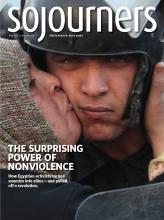On Sept. 15, 1963, a bomb planted by members of the Ku Klux Klan exploded near the basement of the 16th Street Baptist Church in Birmingham, Alabama, killing four girls and injuring more than 22 other children gathered that morning for Sunday school. The four victims -- Addie Mae Collins, 14, Denise McNair, 11, Carole Robertson, 14, and Cynthia Wesley, 14 -- were friends of Carolyn McKinstry, who was also 14 years old and walking through the sanctuary of the church when the bomb exploded.
My parents joined 16th Street Baptist Church when I was 2 years old. It was an exciting place to be. There were always many activities going on for young people, and anybody who was anybody came through our church. I loved coming to church.
Because of the segregation in Birmingham, and because I lived in a very strict household, the church was the one place I could always get permission to come. My parents would say no to so many other places, but they would always say yes to church.
Outside the church was a dark and difficult city. Every aspect of my life growing up in Birmingham was segregated. I was introduced to segregation at a very young age, when my grandfather brought my grandmother to Birmingham. She was very sick, and he had her lying in the back seat of the car. Hospitals in Birmingham did not accept black patients, so we took my grandmother to the Princeton hospital and she was placed in the basement. I sat in the basement of the hospital with my grandmother for two weeks and watched her die. I always wondered why we were in the basement. My grandparents had the funds to pay; he was a country preacher and they were both educators. But they were black.
My second introduction to segregation came just one year later, when I had the privilege of winning the statewide spelling competition. I was our state champion speller, but blacks could not be part of the national competition.
Read the Full Article

